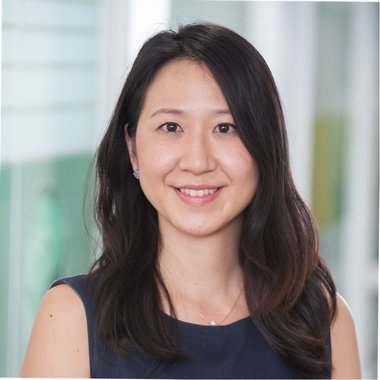2 September 2022
To mark Migraine Awareness Week, which runs from 5 to 11 September, Digital Communications Officer Tom Smurthwaite spoke to Dr Diana Wei [pictured] about the new King’s Health Partners (KHP) Great Ormond Street Hospital (GOSH) Headache Transition Clinic.
Dr Wei, a consultant neurologist specialising in headache disorders at King’s College Hospital and Guy’s and St Thomas’ NHS Foundation Trusts, speaks about how migraine should never be assessed as just a headache.
What is migraine?
Migraine is a common and debilitating headache disorder. It is a neurological brain disorder with an inherited tendency to have headaches with sensory disturbance. This means that it’s part of your genetic makeup. The word headache doesn’t do migraine justice, and people are often told it is just a headache. However, we know that it is more than that. It causes hypersensitivity to light, sound and smell. It causes neck stiffness, mood changes, brain fog and concentration difficulties, symptoms that people do not think are associated with their migraine. Even after the pain has gone, there is this exhaustion that can last up to a few days.
It's really important to understand that migraine is more than just a headache.
How many people are affected by migraine and what can be the impact on their lives?
Migraine is really common. It can affect up to 33% in women and up to 13% in men in their lifetime.
It's so common that it's likely that either you or somebody you know has migraine. It is also one of the top five leading causes of disability in the world for people between the ages of ten and 50.
It can affect people in different ways; some will have infrequent migraines, whereas some have it all the time, and this can change throughout one's life. So it is essential to understand how to manage symptoms when you have a migraine. The effects of migraine are so often underestimated both by patients and those around them.
The effects of migraine can be significant on somebody's personal life, social life, professional life, and on their education. This is why it's so important to have Migraine Awareness Week.
What is the Headache Transition Clinic and what does it hope to achieve for patients?
The term transition is how we describe moving from the children's services to the adult services. It's really important to recognise that there are differences between the two, the foremost being that in the adult services, young people will have more independence over managing their own condition. As migraine is something they will have for some time, it is important for young people with migraine to understand their condition, what they can do to manage it themselves and when to seek help. We also discuss the different treatments available for their condition as they become adults.
It's been a great opportunity to collaborate with our excellent paediatric headache colleagues at Great Ormond Street Hospital (GOSH). Together, we have developed the KHP GOSH Headache Transition Clinic for young people with chronic migraine and other headache disorders requiring specialist input.
Through this multidisciplinary team approach, we hope to make the transition as smooth as possible for our young people with complex migraine and headaches from GOSH to KHP.
How does being part of King’s Health Partners help your work?
It has been crucial. After the young person comes to the transition clinic, they will be seen in the adult services across Guy’s and St Thomas’ and King’s College Hospital. We have excellent and world-renowned headache specialists across all sites. It has been a real collaborative effort, along with the managers across sites being incredibly engaged and working hard on the logistics of it all. So, without the King’s Health Partners, the Headache transition clinic would not be possible.
Visit the Migraine Trust website for more information on migraine and events during the Migraine Awareness Week, in particular the campaign for better care and support for children and young people with migraine https://migrainetrust.org/campaigns/better-migraine-care
For more information on migraine research at King’s College London, please visit https://
To watch the full interview with Dr Diana Wei, see below:
Interview with Dr Diana Wei about the KHP GOSH Headache Transition Clinic - YouTube





